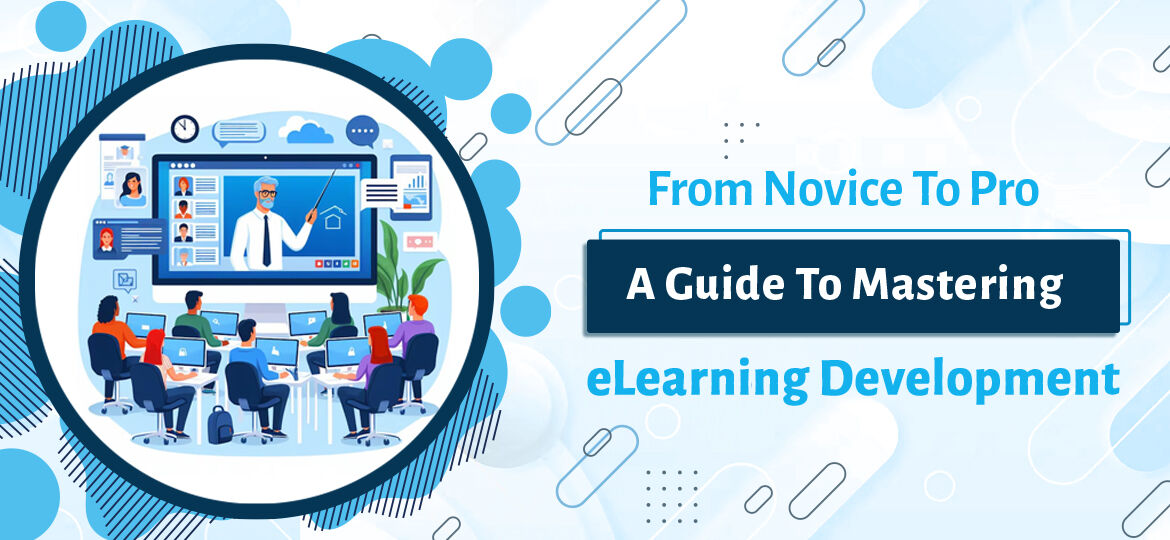
The educational world has become very demanding, where eLearning is an essential component and corporate training needs constant development.
Mastering eLearning Development For Novices
Being an expert in eLearning development is like venturing on a trip over a wide ocean of digital opportunities. To ride the waves of technology and education, one needs a compass of knowledge, a map of abilities, and the wind of enthusiasm. With the help of this article, prospective eLearning developers may learn the ropes, mastering eLearning development to become skilled producers in the field of digital learning.
Novices may find the process of getting started in the realm of eLearning creation intimidating. Yet learners can learn to design engaging online learning experiences by using the right tools and techniques. You can always start by getting familiarized with programs that offer templates and a feasible interface to get your work started.
Understanding the basics of Instructional Design models like ADDIE (analysis, design, development, implementation, and evaluation) is important. You can vouch for the effectiveness and interactivity of your learning material by developing your course typically.
Choosing The Path: Recognizing The Fundamentals
Gaining an understanding of the fundamentals of online education is the first step towards becoming an expert in eLearning programming. This comprises:
- Learning Management Systems (LMSs)
Get acquainted with the different LMS platforms, as these are the settings in which you will host and access your courses. - eLearning standards
Become familiar with xAPI and SCORM, which guarantee content and LMS compatibility. - Instructional Design principles
Gain knowledge of the instructional models and cognitive theories that guide the creation of well-designed courses.
Navigating Instruments: Technical Expertise
An expert in eLearning development has to know their way around the tools of the art. This includes:
- Authoring tools
These programs are necessary to create attractive and interactive courses. - Multimedia creation
This is used to develop your graphic design, animation, and audio and video editing skills. - Programming knowledge
You can create far more engaging and helpful lessons by having some basic knowledge of HTML, CSS, and JavaScript.
Organizing The Content: Educational Planning
A key component of creating eLearning is Instructional Design, which calls for:
- Curriculum development
Acquire the skill of structuring content into logical, coherent, digestible pieces. - Engagement strategies
To make learning more immersive and interesting, include gamification, simulations, and storytelling. - Assessment techniques
To ascertain learning outcomes, develop efficient tests, questionnaires, and quizzes.
Navigating The Digital Ocean: Involvement And Communication
The secret to successful eLearning is engagement. To fascinate students, you need to have:
- Interactive elements
To keep students engaged, use branching situations, interactive tests, and simulations. - Feedback mechanisms
Assist students in understanding the material by offering prompt, helpful comments. - Social learning
Promote teamwork and conversation via peer reviews, chat rooms, and forums.
Keeping Up With Trends And Mastering The Winds
The field of eLearning is always evolving. Keep ahead of the game by engaging in:
- Ongoing education
Stay ahead with the latest advances in eLearning tools, technology, and trends. - Networking
Take part in seminars, webinars, and online learning forums. - Innovation
Try out novel concepts and do not be scared to take calculated chances.
Docking At Expertise: Caliber And Assessment
Ensuring quality is essential. Make sure your classes are excellent by:
- Testing
Make sure your courses function properly across a range of browsers and devices. - Feedback
Ask a wide range of stakeholders and students for their opinions. - Iteration
Make constant improvements to your courses by incorporating feedback.
Conclusion: Mastering eLearning Development
Gaining expertise in eLearning development is an ongoing process. You may progress from a beginner to an expert with work, practice, and a desire to learn, leading to significant and life-changing learning experiences. Keep in mind that the horizon in the world of eLearning is just the beginning of a new adventure. Set out on a path to obtain professional expertise through education.
By using these approaches and the techniques covered in this article, you will be able to develop engaging and effective online learning environments as a skilled eLearning developer. In your eLearning endeavors, never forget to strive for perfection and maintain your curiosity and knowledge.
